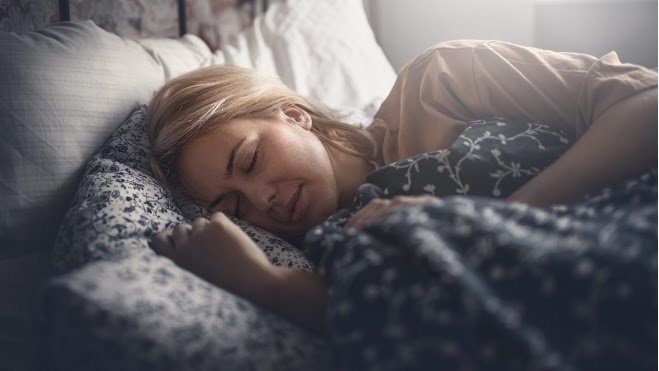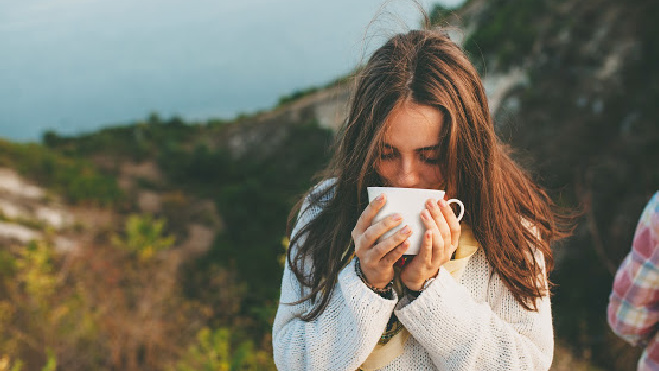
Hack Your Circadian Rhythm for Better Sleep at Night Naturally
Inside This Post: How to hack your circadian rhythm with daily doses of sunshine to help you get better sleep. How to get better sleep at night naturally, without pills.
Hacking Your Circadian Rhythm for Better Sleep
Sleep is vital to our health and day-to-day ability to function well, yet more than one third of Americans don’t get enough of it.
When we aren’t sleeping well, we’re missing out on hundreds of biological processes that occur from quality shut-eye and they can undermine our cognitive function, eating habits, hormone release, emotional stability, immune system, digestion, and the body’s metabolic state.
The thing is… human sleep patterns are largely operated by our internal circadian clock. When our circadian rhythm gets out of synch, all chaos ensues.
According to this published study from MIT, here’s why the circadian rhythm is important:
Studies in animals have found that when circadian rhythm is thrown off, health problems including obesity and metabolic disorders such as diabetes can arise. People who work night shifts have an increased susceptibility to obesity and diabetes. Researchers at MIT have also discovered a link between a disruption in circadian cycles and aging.
“Just about everything that takes place physiologically is really staged along the circadian cycle,” Leonard Guarente senior author of the paper says. “What’s now emerging is the idea that maintaining the circadian cycle is quite important in health maintenance, and if it gets broken, there’s a penalty to be paid in health and perhaps in aging.”
Since we know how important the circadian rhythm is to our body functioning optimally, how do we establish patterns and habits that work hand-in-hand with our internal clock.
The Importance of the Sleep/Wake Cycle
Your body naturally synchs itself with the rise and setting of the sun and light cycles of the earth.
Living in the modern world certainly has it’s benefits, but one of the biggest downside is the negative effect it’s having on sleep patterns.
Your circadian rhythm is basically a 24-hour internal clock which runs in the background of your brain and cycles between sleepiness and alertness at regular intervals.
In short, it’s your sleep/wake cycle.
A part of your hypothalamus (a part of your brain) controls your circadian rhythm but outside factors like lightness and darkness also play a big role.
When it becomes light in the morning, your body receives a signal that it’s time to wake up, be alert and active.
When it’s dark at night, your eyes send a signal to the hypothalamus that it’s time to feel tired. Your brain, in turn, sends a signal to your body to release melatonin, which makes your body tired.
That’s why your circadian rhythm tends to coincide with the cycle of day and nighttime

How Your Circadian Cycle Works
Your body’s circadian system dictates many of your biological processes, including your hormone production, appetite, energy levels and body temperature.
Pretty important huh?
As humans, our circadian rhythm revolves around the patterns of the sun – the rising and falling of it.
Listen to Your Body for Sleep Cues
Pay attention to your body and notice feelings of alertness, sluggish, energy, and drowsiness. This helps you develop better sleep habits and ultimately, help you feel better.
What do I mean?
When it comes to getting sleep back in sync, many people think this means going to bed at a decent hour and getting 8 hours of sleep. Although, I agree a good night’s rest is essential to your well-being, it’s important to understand that it’s not just what you do at night that affects your sleep.
It’s what you do all day long that affects your circadian rhythm and ultimately how well you sleep.
1) Chase the Morning Sun
Morning sun is a powerful way to reset your circadian rhythm, assist with your body’s natural hormone production processes, regulates mood, feeds your mitochondria, and nourishes you in natural vitamin D production (key for health.)
This research study found that people exposed to sunlight or bright indoor light during the morning hours, sleep better at night and tend to feel less depressed and stressed than those who don’t get much morning light.
What to Do: When you rise in the morning, go sit outside (bundle up if you have to) and expose as much of your skin as you can to the morning sun. Don’t wear glasses but allow the sunshine to warm your face. Aim for 30 minutes of sunshine.

Why is sun important for vitamin D?
The molecules in the body which produce vitamin D, are present in the skin and activated by sun. When you lack Vitamin D (Vitamin D deficient), it can show up with weak bones, lack of calcium and various skin and hair issues.
2) Schedule Sunshine Breaks Into Your Day
Exposure to sunlight throughout the day is just as important as starting to day with light exposure. If you work inside, under florescent lights and never leave your desk, schedule breaks during the day to step outside and exposure your eyes and skin to natural light.
Studies show this not only improves workplace performance but helps to harmonize your circadian rhythm, putting you in a better spot for a good night’s sleep.
3) Nighttime is for Darkness… Not Screens & More Light
Exposure to more light during the day and less light at night is critical for maintaining healthy sleep patterns because the body’s natural internal clock is matched with the darkness of the sun setting. in the journal Sleep Health limiting light at night helps to calibrate the body’s natural circadian cycles.
Keep in mind, your circadian clock uses light and dark to tell the body what to do in the future. If it’s nighttime and your body is flooded with light, it’s not easily going to wind down for bedtime.
The CDC Website backs up this fact by saying, “Bright evening light 2 hours before bedtime will shift the time for sleep later, so you will tend to get sleepy and fall asleep later in the evening.”
Aside from soaking in your morning sun and schedule sunshine breaks throughout the day, there are a few extra steps you can take in the evening to prepare your body for sleep.
- Avoid Blue Light After Sundown.
This is exposure through screens, devices, television and of course your phone. You can add blue screen blockers and use apps (like flux.com) to your computer, however the best way to continue with your norming viewing without affecting your sleep is to use blue blocker glasses to block out your blue light exposure.
- Change lightbulbs to Block the Blue Light.
You can switch all your lights off at night so you don’t have any light exposure, use blue light blocking lightbulbs or switch your bedroom, bathroom and rooms you use most at night to red light bulbs.

What else Helps with Getting Good Nighttime Sleep?
- Room Temperature. When melatonin is released by the pineal glad, it causes the body to lose some heat. As the body temperature drops by a degree or two (compared to daytime), this helps speed the onset of sleep. Keeping your bedroom on the cooler side, helps your body move into this process even more, and stay in a deeper sleep longer. Experts say the ideal room temperature is between 60 – 68 degreesFahrenheit, but pick a temperature you’re comfortable with.
- Keep a Dark Bedroom for Sleep, especially if there’s a full moon, outside lights or passing cars which can shine lights into your bedroom is important for going to, and staying asleep. Look into room darkening curtains or shades which fit your casings closely to keep cracks of light out.
- Clean Air can play a big role whether you’re breathing in allergens or irritants that keep you up at night, cause congestion or mucus build up. We run our air purifier 24 hours a day and move it into our bedroom at night to keep the air in our room clean. Each of my children has a HEPA filtered air purifier in their room as well to keep irritants from disrupting sleep.
- If you have allergies or are affected by chemicals or irritants, it could be time to consider an organic and clean pillow and sheet set. A year ago, we found out our daughter was allergic to feathers and once we replaced her pillow with an OEKO-TEX® Certified Organic Everpillow (use code Parent to get 10% off) filled with organic kapok and latex, the sniffling and tossing and turning also stopped at night. (We have a few of these in our house and love how you can unzip and take out extra filling to customize the fit for each person’s preference and sleep style.)